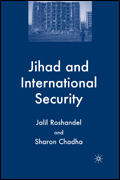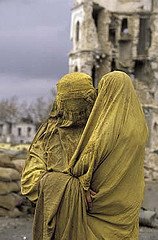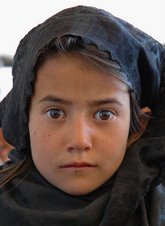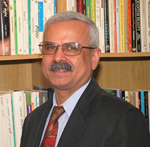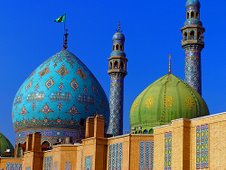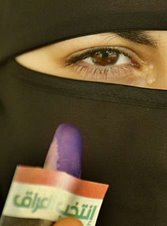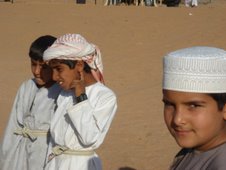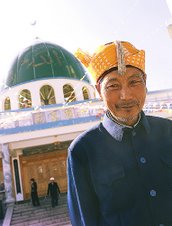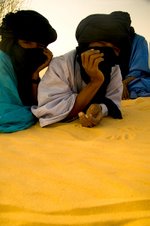The magazine you need to read on Afghanistan
Friday, December 17, 2010
Sunday, March 7, 2010
It's official: Iraq is a democracy
So the BBC pronounces: "It is reasonable now to include Iraq in the world's list of democracies."
Monday, December 28, 2009
Statement from the righteous family of the Underwear Bomber
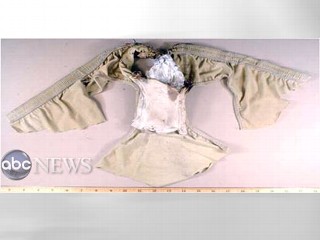
Our family, like the rest of the world, were woken up in the early hours of Saturday, 26th December, 2009 to the news of an attempt to blow up a plane by a young Nigerian man, who was later identified as Umar Farouk AbdulMutallab. Umar Farouk AbdulMutallab is the son of Alhaji (Dr.) Umaru AbdulMutallab, the head of this family.
Prior to this incident, his father, having become concerned about his disappearance and stoppage of communication while schooling abroad, reported the matter to the Nigerian security agencies about two months ago, and to some foreign security agencies about a month and a half ago, then sought their assistance to find and return him home. We provided them with all the information required of us to enable them do this. We were hopeful that they would find and return him home. It was while we were waiting for the outcome of their investigation that we arose to the shocking news of that day.
The disappearance and cessation of communication which got his mother and father concerned to report to the security agencies are completely out of character and a very recent development, as before then, from very early childhood, Farouk, to the best of parental monitoring, had never shown any attitude, conduct or association that would give concern. As soon as concern arose, very recently, his parents reported it and sought help.
The family will continue to fully cooperate with local and international security agencies toward the investigation of this matter, while we await results of the full investigation.
We, along with the whole world, are thankful to almighty God that there were no lives lost in the incident. May God continue to protect us all, amen.
Finally, as the matter is being investigated by the various agencies, and has already been mentioned in aU.S. court, the family requests that the press should regard this as the only statement it will make for now.
Thank you.
Signed,
The Mutallab Family
Abuja, Nigeria
Thursday, November 26, 2009
How Afghans assess the situation
Oxfam's chief executive said the message from ordinary people in Afghanistan was that "all sides must stop targeting civilians".
They wanted international forces to tighten their restrictions on air strikes and night raids and to investigate properly all allegations of harm to civilians, she said.
The Afghan people interviewed also wanted insurgents to "stop taking refuge in civilian areas, which puts normal Afghans on the front lines of the conflict", she added.Seems fair enough to me.
Sunday, November 22, 2009
Afghans whup Taliban: 6-0
The New York Times reports:
American and Afghan officials have begun helping a number of anti-Taliban militias that have independently taken up arms against insurgents in several parts of Afghanistan, prompting hopes of a large-scale tribal rebellion against the Taliban.
The emergence of the militias, which took some leaders in Kabul by surprise, has so encouraged the American and Afghan officials that they are planning to spur the growth of similar armed groups across the Taliban heartland in the southern and eastern parts of the country.Why now? Apparently, some Afghans have had enough:
In July, a long-running dispute between local Taliban fighters and elders from the Shinwari tribe flared up. When a local Taliban warlord named Khona brought a more senior commander from Pakistan to help in the confrontation, the elders in the Shinwari tribe rallied villagers from up and down the valley where they live, killed the commander and chased Khona away.How is the tribe doing? They appear to be kicking the "stray dogs" you-know-whats.
The elders had insisted that the Taliban stay away from a group of Afghans building a dike in the valley. When Khona’s men kidnapped two Afghan engineers, the Shinwari elders decided they had had enough.
“The whole tribe was with me,” one of the elders said in an interview. “The Taliban came to kill me, and instead we killed them.”
Since the fight, the Taliban have been kept away from a string of villages in Achin District that stretch for about six miles. The elders said they were able to do so by forming a group of more than 100 fighters and posting them at each end of the valley.Now imagine giving every man, woman, and child in Afghanistan - every school girl and her grandma - a cell phone so that every villager in trouble could call one of these local militias. How much longer do you think their fathers, sons, and brothers would allow the Taliban survive a menacing visit to their homes or schools?
Forget road and school building. Bring these people phone service and let them establish their own security and educational opportunities.
Saturday, November 7, 2009
Finally some good news about Pakistan
Or at least hope that at last we'll have a reliable source of information.
Pakistan Conflict Monitor, a website devoted to "research and analysis on the conflict in Pakistan" is now in the business, to paraphrase their mission statement, of systematically monitoring over 1,500 websites, as well as dozens of e-mailing lists and academic journals, to cull together the latest in academic research and insight on the conflict in Pakistan.
Sunday, November 1, 2009
Here's another good analysis of the US debate on Afghanistan
From Tom Ricks, who covered the US military for the Washington Post (2000-2008), and author of The Gamble, another must-read on US war strategy.
He comments on the differences between Tom Friedman, NYT's columnist and David Ignatius of the Washington Post. As he writes:
Both are centrist middle-aged white men writing for major newspapers. Both also are successful authors, though the Rousseauian Friedman produces optimistic non-fiction works, while the more Hobbesian Ignatius writes dark thrillers about intelligence. Also, I think Friedman tends to be influenced a bit more by diplomats, while Ignatius seems a bit more plugged into the worlds of intelligence and the military.Friedman, he writes:
thinks that Iraq is more important than Afghanistan and Pakistan. I disagree, but this may be in part because he lived in Lebanon and Israel, while I lived in Afghanistan. I think the situation in Afghanistan and Pakistan threatens the United States far more than anything in Iraq does. That is, I think Pakistan is deteriorating quickly and has weapons of mass destruction and Islamic extremists who are gaining ground, while Iraq is only deteriorating slowly, has no WMD (remember, Tom?) and its few Islamic extremists are on their heels.Whereas Ignatius still believes that a surge could work in Afghanistan. But, as he goes on to say:
I wish Ignatius also had written about the need to have U.S. troops protect the people from the brutality and abuses of Afghan soldiers and police. The need for more U.S. forces isn't just about insurgents. The predatory behavior of some of them has driven Afghans into the arms of the Taliban. Having American units partnered with Afghan forces won't stop such abuses, but it will lessen them. For example, I am told there currently are five checkpoints between Spin Boldak and Kandahar, with official shakedowns of truck drivers at each. Such corruption is a tax on the stomachs of poor Afghans. Get rid of the unnecessary checkpoints, and have Americans around the other ones, and fewer Afghans will go hungry.
Must-read on the recent CIA leak
The one about Karzai's "heroin-dealing" brother being a paid CIA asset. Some excerpts from the article by Robert Haddick's Foreign Policy Small Wars blog.
As Haddick notes:
The Times's sources for this [leak] included "current and former American officials" including a former CIA officer and perhaps a senior U.S. military officer in Kabul. Karzai acknowledged aiding U.S. efforts but denied receiving any payments from the CIA.''
Haddick then poses the key questions:
Did frustration and moral outrage with Karzai's illicit activities lead U.S. officials to expose him as a paid CIA asset? It would certainly be understandable, for these officials may have a low opinion of him and perhaps by association his brother the president. But this collective outburst is folly and will make a nearly impossible task for the United States in Afghanistan only that much harder.
The U.S. officials who exposed Karzai are likely hoping that with his status now public, he will no longer be useful to the CIA. Perhaps they are hoping that the CIA will be too embarrassed to continue paying him. As the Times piece discusses, some officials believe that if the U.S. really wants better governance in Afghanistan, it must begin by getting rid of types like him.But, as Haddick goes on to observe:
U.S. officials have to deal with Afghanistan society as it is, not as they wish it might be. With no history of a successful strong central government, and not much prospect of establishing it anytime soon, U.S. officials have to deal with local strongmen. If, perhaps like Ahmed Wali Karzai, the local strongman is both very powerful and equally unsavory, U.S. military, State Department, and CIA field officers will have to weigh the feasible alternatives, if any can be found. If there are no alternatives, U.S. officials will have to quietly decide whether the mission is worth the moral consequences.Anyway, read the whole piece.
Thursday, October 29, 2009
Hillary warns Pakistan
From Bloomberg News:
“Al-Qaeda has had safe haven in Pakistan since 2002,” Clinton told a group of editors in the eastern Pakistani city of Lahore. “I find it hard to believe that nobody in your government knows where they are and couldn’t get them if they really wanted to. Maybe that’s the case; maybe they’re not gettable. I don’t know.”. . .
Saying that she was “more than willing” to listen to Pakistani complaints about U.S. policies, Clinton stressed that Pakistan has to be mindful of American security concerns.
“But this is a two-way street,” Clinton said. “I ask in the pursuit of mutual respect that you take seriously our concerns.”P.S. I wouldn't take her comments lightly either.
Update: John McCreary apparently also agrees that what Hillary said needed to be said (via Tom Ricks who describes McCreary as someone "who has forgotten more about intelligence than I will ever know":
Bravo for Secretary Clinton. Either the Pakistani security services contain senior officers who know where bin Laden is and are lying or they are incompetent and ought to be dismissed. There are no other explanations for Pakistan having become the headquarters for al Qaida and the base area for international Islamic terrorism.
Wednesday, October 28, 2009
Tuesday, October 27, 2009
Advice to Afghans: Read the handwriting on the American wall before it is too late
Sample Number One:
Matthew Hoh's resignation letter. Hoh served as the Senior Civilian Representative of the US State Department in Zabul Province, Afghanistan and submitted this letter to his superiors in early September. Here some key excerpts:
Like the Soviets, we continue to secure and bolster a failing state, while encouraging an ideology and system of government unknown and unwanted by its people.On the negative impact Americans are having:
If the history of Afghanistan is one great stage play, the United States is no more than a supporting actor, among several previously, in a tragedy that not only pits tribes, valleys, clans, villages and families against one another, but, from at least the end of King Zahir Shah's reign, has violently and savagely pitted the urban, secular, educated and modern of Afghanistan against the rural, religious, illiterate and traditional. It is this latter group that composes and supports the Pashtun insurgency.
The United States military presence in Afghanistan greatly contributes to the legitimacy and strategic message of the Pashtun insurgency. In a like manner our backing of the Afghan government in its current form continues to distance the government from the people. The Afghan government's failings, particularly when weighed against the sacrifices of American lives and dollars, appear legion and metastatic:
As Hoh concludes:- Glaring corruption and unabashed graft;
- A President whose confidants and chief advisors comprise drug lords and war crimes villains, who mock our own rule of law and counternarcotics efforts;
- A system of provincial and district leaders constituted of local power brokers, opportunists and strongment allied to the United States solely for, and limited by, the value of our USAID and CERP contracts and whose own political and economic interests stand nothing to gain from any positive or geniune attempts at reconciliation;
I find specious the reasons we ask for bloodshed and sacrifice from our young men and women in Afghanistan. If honest, our stated strategy of securing Afghanistan to prevent al-Qaeda resurgence or regrouping would require us to additionally invade and occupy western Pakistan, Somalia, Sudan, Yemen, etc....to follow the logic of our stated goals, we should garrison Pakistan, not Afghanistan.
While Americans would be advised to read this letter closely as well, ultimately, Afghans are the ones who are going to have to address these criticisms. Maybe it is already too late.
Thursday, October 8, 2009
Saudis lining up to queue
The Associated Press reports from inside the corridors of the UN climate talks in Bangkok:
Saudi Arabia has led a quiet campaign during these and other negotiations — demanding behind closed doors that oil-producing nations get special financial assistance if a new climate pact calls for substantial reductions in the use of fossil fuels.The head of the Saudi delegation, Mohammad S. Al Sabban explains:
We are among the economically vulnerable countries,” Al Sabban told The Associated Press on the sidelines of the talks ahead of negotiations in Copenhagen in December for a treaty to replace the Kyoto Protocol, which expires in 2012.
“This is very serious for us,” he continued. “We are in the process of diversifying our economy but this will take a long time. We don't have too many resources.”
Saudi Arabia, which sits atop the world's largest proven oil reserves, is seeing economic growth slide because of fallout from the global meltdown, but experts still expect the country, flush with cash from oil's earlier price spike last year, to be better able than other nations to cope with the current crisis.
Al Sabban accused Western nations of pursuing an agenda against oil producers, under the guise of protecting the planet.
“Many politicians in the Western world think these climate change negotiations and the new agreement will provide them with a golden opportunity to reduce their dependence on imported oil,” Al Sabban said. “That means you will transfer the burden to developing countries, especially to those highly dependent on the exploitation of oil.”
Al Sabban said his country wanted a new deal and was not impeding progress in talks as some activists have claimed.Meanwhile, in Detroit, Americans already lining up for economic assistance and a reader hit by flooding in India comments: "Gee, they don't look hungry."]
Missionless fatigue
“You give them all the humanitarian assistance that they want and they’re still going to lie to you. They’ll tell you there’s no Taleban anywhere in the area and as soon as you roll away, ten feet from their house, you get shot at again,” said Specialist Eric Petty, from Georgia. . . .
The soldiers complain that rules of engagement designed to minimise civilian casualties mean that they fight with one arm tied behind their backs. “They’re a joke,” said one. “You get shot at but can do nothing about it. You have to see the person with the weapon. It’s not enough to know which house the shooting’s coming from.”...
To compound matters, soldiers are mainly being killed not in combat but on routine journeys, by roadside bombs planted by an invisible enemy. “That’s very demoralising,” said Captain Masengale.
Friday, September 18, 2009
Israel's Defense Minister speaks: "Iran does not constitute an existential threat against Israel"
Reuters reports:
Israeli Defense Minister Ehud Barak was quoted on Thursday as saying he does not view Iran as a threat to the existence of the Jewish state, a view that would seem to depart from Israeli statements of the recent past.
Israel's mass-circulation Yedioth Ahronoth daily quoted Barak, the head of Israel's center-left Labour party, as saying "Iran does not constitute an existential threat against Israel."
In response to a question about Tehran's nuclear programme which Israel has said it sees as destined to produce atomic weapons that could put its existence at risk, Barak said in an interview with the paper:
"I am not among those who believe Iran is an existential issue for Israel."
Thursday, September 17, 2009
Wednesday, September 9, 2009
When not to outsource?
From today's London Times:
Art Keller, a blond, blue-eyed CIA agent, sits inside a decrepit building deep inside al Qaeda territory, staring at his computer screen. He is forbidden by his Pakistani minders from venturing out into the badlands of Waziristan to help to find and kill the world’s most wanted man.
...Mr Keller was one of an estimated 50 to 100 CIA agents and special operations officers whose mission for the past eight years has been to find and kill bin Laden and other top al-Qaeda leaders. . .
Some of these guys have been hunting bin Laden for years,” Mr Keller says. His replacement, whom Mr Keller believes is still in Pakistan, has spent eight months a year since the September 11 attacks working out of these CIA safe houses looking for the top al-Qaeda leadership.
The hunt for bin Laden is largely run by the ISI, the Pakistani intelligence service, an organisation for whom many CIA officials harbour deep mistrust because of its historical ties to the Pashtuns of Waziristan. . . CIA agents were rarely allowed to leave the compound by the Pakistanis. . .
“Our role in the hunt was done entirely from in front of a computer inside the base,” Mr Keller says. When he wanted to follow up a lead, he would get in touch with a local Pashtun proxy to ask him to travel to a certain area to glean information.
When a senior al-Qaeda figure was identified and located — Mr Keller said that it would take weeks, often months, to build a case for an airstrike by a US Predator drone — and even if the go-ahead was finally given by CIA headquarters in Langley, Virginia, the Pakistanis still had to approve. “Since 9/11, with 99 per cent of these strikes, the Pakistanis were consulted and they have to approve them,” he said.
...even if someone wanted to betray him — and collect the $25 million (£15 million) reward — there is no one to turn to. The local police know bin Laden is there. “If you report bin Laden’s location there is a good chance you will get killed,” Mr Keller says.
Monday, September 7, 2009
Poppy culture: Update on opium
 From the 2009 "Afghan Opium Survey", the annual report produced by the UN Office on Drugs and Crime:
From the 2009 "Afghan Opium Survey", the annual report produced by the UN Office on Drugs and Crime:
- Poppy cultivation declined 22 percent from May 2008 to June 2009 from 477 acres to 304 acres (or if you prefer your statistics in hectares - from 193,000 hectares to 123,000).
- 20 out of 34 provinces are now poppy free.
- 90 tons of the chemicals to produce heroin
- 450 tons of poppy seeds
- 50 tons of opium
- 7 tons of morphine
- 1.5 tons of heroin
- 19 tons of hash
- 27 laboratories
Monday, May 11, 2009
A Swat refugee's Sophies' choice
From today's Washington Post:
"When the shelling started, my wife and I ran out to gather the children. It was like a hell outside, and we just started running," recounted Taj Mahmad, 35, a vegetable-cart puller. "I realized that my son and my smallest daughter were missing. She is only 3. But my wife cried and said the rest of us would be killed if we stayed, so we kept going. I have no idea what happened to them."I'm trying to be sympathetic to the pressure they must have been under but all I can think of is this couple has too many children. I mean, they didn't know where their 3-year-old was?
Sunday, May 10, 2009
What are we doing wrong in Afghanistan?
Spending too much money on security for Westerners for starters according to a report published by Truthout. The report also gives us an idea why we've been so clueless:
There have been numerous attacks on foreigners in Kabul and suicide bombings have been effective from the Taliban's point of view in driving almost all expatriates into well-defended compounds where living conditions may be luxurious but which are as confining as any prison. This means that many foreigners sent to Afghanistan to help rebuild the country and the state machinery seldom meet Afghans aside from their drivers and a few Afghans with whom they work.






